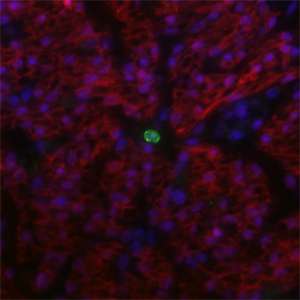A tool for isolating progenitor cells from human heart tissue could lead to heart repair

A*STAR researchers and colleagues have developed a method to isolate and expand human heart stem cells, also known as cardiac progenitor cells, which could have great potential for repairing injured heart tissue.
Cardiovascular disease is the leading cause of death and debilitating injury in the world today. Heart attacks damage cardiac muscle cells, or 'cardiomyocytes', often leading to irreversible functional damage. A potential treatment option for long-term recovery is to replace the damaged cells with new functional cardiomyocytes through stem cell therapy, which could limit or even reverse the damage.
Early trials on mice treated with stem cells of non-cardiac origin—bone mesenchymal stem cells and peripheral blood stem cells, for example—had limited success mainly due to a failure to graft on to the host tissue. However, much interest was sparked by the discovery that the adult heart contains a small population of tissue-specific stem cells. "This 'next generation' stem cell-based therapy using cardiac progenitor cells will allow us to move much closer to getting a robust and effective solution to heart repair" explains Andre Choo from the A*STAR Bioprocessing Technology Institute (BTI).
Previous studies have shown that mouse cardiac progenitor cells isolated and expanded by targeting their surface marker—a protein called 'Stem cell antigen-1', or Sca-1 for short—can efficiently engraft into existing heart tissue and form cardiomyocytes. Cells with similar properties have been found in human heart tissue but the lack of a Sca-1 equivalent in human cells has prevented clinical applications.
Choo, along with Leung Hau Wan (also from the BTI), and other colleagues were determined to find a way to isolate and expand these cells in humans. They found that a monoclonal antibody (C19) was able to recognize the protein GRP78, decorated with a unique sugar moiety on the surface of human cardiac progenitor cells. The antibody could then be used to isolate these cells from both foetal hearts and pluripotent stem cells undergoing differentiation towards cardiomyocytes.
The team was able to expand and stimulate the isolated human cardiac progenitor cells to generate all three cardiac cell types: cardiomyocytes, smooth muscle cells and endothelial cells, making them an ideal source for cell-based cardiac repair. Compared with stem cells that are able to differentiate into many more cell types, "the restricted differentiation lineage of the cardiac progenitor cells will greatly improve the safety aspect of such stem cell therapeutics" says Choo.
Further characterization of human cardiac progenitor cells and their differentiation mechanisms will pave the way for more tools to manipulate them so that their full therapeutic potential may be realized.
More information: "mAb C19 targets a novel surface marker for the isolation of human cardiac progenitor cells from human heart tissue and differentiated hESCs." Journal of Molecular and Cellular Cardiology 82, 228–237 (2015). dx.doi.org/10.1016/j.yjmcc.2015.02.016



















